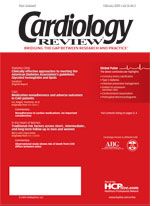Publication
Article
Cardiology Review® Online
A patient in need of aggressive risk factor modification
Mr. Jones is a hypothetical 55-year-old patient with some common cardiovascular risk factors (smoking, moderate obesity, borderline high cholesterol, prehypertension) but with no personal or family history of coronary heart disease. He has a demanding lifestyle, and he reports a number of chronic financial and interpersonal
stressors, such as uncertainty at work (a number of his colleagues have suffered layoffs and transfers), financial problems, and caretaking responsibilities for his spouse, who has significant medical problems. A number of indications suggest that Mr. Jones may have a hyperdynamic circulation, for example, his blood pressure readings at several consecutive office visits are quite variable, and, on ambulatory blood pressure monitoring, he shows wide fluctuations in cardiovascular activity that appear to be related to periods of mental stress during the day.
Given his unremarkable risk factor profile, however, he is not currently being treated for risk factor management. Findings such as those presented in the feature (page 28) suggest that the risk for cardiovascular events in such a patient may be greater than would otherwise be suspected based upon his age and risk factor profile, and that efforts at aggressive risk factor modification may be warranted. Although this decision strategy is consistent with results from the current report, further research is needed to extend the use of a mental stress battery to clinical practice.
